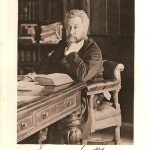 From: http://www.rbap.net/
From: http://www.rbap.net/
#1 The Holy Spirit is the Only Infallible Interpreter of Holy Scripture.
As an example of this principle, John Owen says, “The only unique, public, authentic, and infallible interpreter of Scripture is none other than the Author of Scripture Himself . . . that is, God the Holy Spirit.”[1] Nehemiah Coxe says, “. . . the best interpreter of the Old Testament is the Holy Spirit speaking to us in the new.”[2] This meant that they saw the Bible’s interpretation and use of itself as infallible and with interpretive principles embedded in it. When the Bible comments upon, or utilizes itself in any fashion (e.g., direct quotation, allusion, echo, or fulfillment in the OT or NT), it is God’s interpretation and, therefore, the divine understanding of how texts should be understood by men. This often means that later texts shed interpretive light on earlier texts. This occurs not only when the New Testament uses the Old Testament, but it occurs in the Old Testament itself. Or, we could put it this way: subsequent revelation often makes explicit what is implicit in antecedent revelation.[3]
[1] John Owen, Biblical Theology or The Nature, Origin, Development, and Study of Theological Truth in Six Books (Pittsburgh, PA: Soli Deo Gloria Publications, 1994), 797.
[2] Coxe and Owen, Covenant Theology, 36.
[3] See Vern S. Poythress, “Biblical Hermeneutics,” in Seeing Christ in all of Scripture: Hermeneutics at Westminster Theological Seminary, ed. Peter A. Lillback (Philadelphia, PA: Westminster Seminary Press, 2016), 14, where he says: “The later communications build on the earlier. What is implicit in the earlier often becomes explicit in the later.”
#2 The Analogy of the Scriptures (Analogia Scripturae)
Here is Richard A. Muller’s definition of analogia Scripturae: “the interpretation of unclear, difficult, or ambiguous passages of Scripture by comparison with clear and unambiguous passages that refer to the same teaching or event.”[1] An example of this would be utilizing a passage in Matthew to help understand a passage dealing with the same subject in Mark. This principle, as with the first one, obviously presupposes the divine inspiration of Scripture.
The principle of analogia Scripturae gained confessional status as follows: “The infallible rule of interpretation of scripture is the scripture itself . . .” (2LCF 1.9).
[1] Richard A. Muller, Dictionary of Latin and Greek Theological Terms (Grand Rapids: Baker Book House, 1985, Second printing, September 1986), 33; emphasis added.
#3 The Analogy of Faith (Analogia Fidei)
Muller defines analogia fidei as follows:
the use of a general sense of the meaning of Scripture, constructed from the clear or unambiguous loci [i.e., places] . . ., as the basis for interpreting unclear or ambiguous texts. As distinct from the more basic analogia Scripturae . . ., the analogia fidei presupposes a sense of the theological meaning of Scripture.[1]
This principle has not always been understood properly. For example, Walter C. Kaiser, Jr. fails to distinguish properly between analogia Scripturae and analogia fidei and advocates what he calls “The Analogy of (Antecedent) Scripture.”[2] While analyzing the principle of the analogy of faith, he says, “Our problem here is whether the analogy of faith is a hermeneutical tool that is ‘open [theological] sesame’ for every passage of Scripture.”[3] While discussing his proposal for “The Analogy of (Antecedent) Scripture,” Kaiser confidently asserts:
Surely most interpreters will see the wisdom and good sense in limiting our theological observations to conclusions drawn from the text being exegeted and from texts which preceded it in time.[4]
In the conclusion to his discussion, he says:
However, in no case must that later teaching be used exegetically (or in any other way) to unpack the meaning or to enhance the usability of the individual text which is the object of our study.[5]
This is, at worst, a denial of the historic understanding of analogia fidei and, at best, a very unhelpful and dangerous modification of the principle. This would mean, for example, that we cannot utilize anything in the Bible outside of Genesis 1-3 to help us interpret it. Since there is nothing in the Bible antecedent to Genesis 1-3, interpreters are left with no subsequent divine use, no subsequent divine explanation of how to understand those chapters. This method ends up defeating itself when we consider that Genesis (and all other books of the Bible) was never intended to stand on its own.[6] As well, the Bible itself (OT and NT) comments on antecedent texts, helping its readers understand the divine intention of those texts. Kaiser’s method seems to imply that the exegesis of a given biblical text is to be conducted as if no subsequent biblical texts exist. We must realize that, in one sense, we have an advantage that the biblical writers did not have—we have a completed canon. But we must also realize that the Bible’s use of itself (whenever and however this occurs) is infallible. If this is so, then the exegete, using tools outside of the biblical text under consideration, ought to consult all possible useful tools, which includes how the Bible comments upon itself no matter where or how it does so. If the Holy Spirit is the only infallible interpreter of Holy Scripture, then certainly exegetes ought to utilize biblical texts outside of Genesis to aid in the understanding of it. It seems to me that Kaiser’s proposal would give warrant for exegetes to consult fallible commentaries on Genesis to aid in its interpretation, but deny the use of the Bible itself (which contains inspired and infallible commentary) to that same end.
An example of the proper understanding and use of the analogy of faith would be identifying the serpent of Genesis 3. We can say with utter certainty that the serpent is the devil and Satan. We know this because God tells us via subsequent Scripture in Revelation 12:9, “And the great dragon was thrown down, the serpent of old who is called the devil and Satan” and 20:2, “And he laid hold of the dragon, the serpent of old, who is the devil and Satan.” So, according to the analogy of faith, we can affirm that the serpent of Genesis 3 is the devil and Satan.
The inspired and infallible rule of faith is the whole of Scripture, whose textual parts must be understood in light of its textual-theological whole. This insures that the theological forest is not lost for the individual textual trees. It should keep us from doing theology concordance-style, doing word-studies as an end-all to interpretation, and counting texts that use the same words and drawing theological conclusions from it. These methods often do not consider the meaning of the text (or word) under investigation in light of the various levels of context (i.e., phrase, clause, sentence, pericope, book, author, testament, canon) in which it occurs. The principle of the analogy of faith also warrants that, when we are seeking to understand any text of Scripture (e.g., Gen. 1-3), all texts of Scripture are fair game in the interpretive process. Or it could be stated this way: the context of every biblical text is all biblical texts.
The principle of analogia fidei gained confessional status as follows:
The infallible rule of interpretation of scripture is the scripture itself; and therefore, when there is a question about the true and full sense of any scripture, (which is not manifold, but one,) it must be searched and known by other places that speak more clearly. (2LCF 1.9)
[1] Muller, Dictionary, 33.
[2] Walter C. Kaiser, Jr., Toward An Exegetical Theology (1981; reprint, Grand Rapids: Baker Book House, Sixth printing, January 1987), 134ff.
[3] Kaiser, Toward An Exegetical Theology, 135; bracketed word original.
[4] Kaiser, Toward An Exegetical Theology, 137.
[5] Kaiser, Toward An Exegetical Theology, 140; emphasis original.
[6] The OT is not an end itself; it is heading somewhere and demands answers to various issues left unfulfilled. It sets the stage for God’s future acts of redemption and assumes that God will follow his redemptive acts with corresponding redemptive-revelational words. The OT cannot stand on its own; it is an open-ended book and must be interpreted as such. The NT provides the rest of the story. See Dennis E. Johnson, Him We Proclaim: Preaching Christ from All the Scriptures (Phillipsburg, NJ: P&R Publishing, 2007), 160, n. 51, where he takes Kaiser to task for claiming that the OT can stand on its own. In Walter C. Kaiser, Jr., Preaching and Teaching from the Old Testament: A Guide for the Church (Grand Rapids: Baker, 2003), 27, he claims: “The Old Testament can stand on its own, for it has done so both in the pre-Christian and the early Christian centuries.” Johnson replies: “As will be argued in Chapter 6, the preacher to the Hebrews saw in the Old Testament Scriptures themselves various indications that the Old Testament and its institutions could not ‘stand on their own[‘] but testified to a better, more ‘perfect’ order to come.” Johnson’s book is highly recommended. Reading and interpreting the OT on its own is like reading the Gospels without the Epistles, the Epistles without the Gospels, the Prophets without the Pentateuch, the Pentateuch without the Prophets, and the NT without the OT. Kaiser’s position seems to entail reading and interpreting the OT without the New. If this is the case, it would give the appearance of over-emphasizing the human authorial element of Holy Scripture. The apostle Peter informs us, concerning the writing prophets of the OT: “It was revealed to them that they were not serving themselves, but you, in these things which now have been announced to you through those who preached the gospel to you by the Holy Spirit sent from heaven—things into which angels long to look” (1 Pet. 1:12). The prophets wrote with a future-oriented messianic consciousness. What they predicted happened when our Lord came and the NT interprets our Lord in light of the OT.
#4 The Scope of the Scriptures (Scopus Scripturae)
Terms such as Christ-centered and Christocentric are used often in our day. But what do they mean? The older way of naming the concept these terms point to, the target or end to which the entirety of the Bible tends, is encapsulated by the Latin phrase scopus Scripturae (i.e., the scope of the Scriptures). This concept gained confessional status in the WCF, the SD, and the 2LCF in 1.5, which, speaking of Holy Scripture, say, “. . . the scope of the whole (which is to give all glory to God) . . .”
Reformation and post-Reformation Reformed theologians understood scope in two senses. It had a narrow sense—i.e., the scope of a given text or passage, its basic thrust—but it also had a wider sense—i.e., the target or bull’s eye to which all of Scripture tends.[1] It is to this second sense that we will give our attention.
Scope, in the sense intended here, refers to the center or target of the entire canonical revelation; it is that to which the entire Bible points. And whatever that is, it must condition our interpretation of any and every part of Scripture. For the federal or covenant theologians of the seventeenth century, the scope of Scripture was the glory of God in the redemptive work of the incarnate Son of God.[2] Their view of the scope of Scripture was itself a conclusion from Scripture, not a presupposition brought to it, and it conditioned all subsequent interpretation.
William Ames, for example, said, “The Old and New Testaments are reducible to these two primary heads. The Old promises Christ to come and the New testifies that he has come.”[3] Likewise, John Owen said, “Christ is . . . the principal end of the whole of Scripture . . .”[4] He continues elsewhere:
This principle is always to be retained in our minds in reading of the Scripture,—namely, that the revelation and doctrine of the person of Christ and his office, is the foundation whereon all other instructions of the prophets and apostles for the edification of the church are built, and whereunto they are resolved . . . So our Lord Jesus Christ himself at large makes it manifest, Luke xxiv. 26, 27, 45, 46. Lay aside the consideration hereof, and the Scriptures are no such thing as they pretend unto,—namely, a revelation of the glory of God in the salvation of the church . . .[5]
Coxe said, “. . . in all our search after the mind of God in the Holy Scriptures we are to manage our inquiries with reference to Christ.”[6]
Their Christocentric interpretation of the Bible was a principle derived from the Bible itself, and an application of sola Scriptura to the issue of hermeneutics. In other words, they viewed the Bible’s authority as extending to how we interpret the Bible. Or it could be stated this way: they saw the authority of Scripture extending to the interpretation of Scripture.[7]
[1] See the discussion in Richard A. Muller, Post-Reformation Reformed Dogmatics: The Rise and Development of Reformed Orthodoxy, ca. 1520 to ca. 1725, Volume Two – Holy Scripture (Grand Rapids: Baker Academic, 2003 [Second Edition]), 206-23, where he discusses these distinctions. See also James M. Renihan, “Theology on Target: The Scope of the Whole (which is to give all glory to God),” RBTR II:2 (July 2005): 36-52; Richard C. Barcellos, “Scopus Scripturae: John Owen, Nehemiah Coxe, our Lord Jesus Christ, and a Few Early Disciples on Christ as the Scope of Scripture,” Journal of the Institute of Reformed Baptist Studies [JIRBS] (2015): 5-24; and Stephen J. Casselli, Divine Rule Maintained: Anthony Burgess, Covenant Theology, and the Place of the Law in Reformed Scholasticism (Grand Rapids: Reformation Heritage Books, 2016), 102-07.
[2] See my forthcoming The Doxological Trajectory of Scripture: God Getting Glory for Himself through what He does in His Son — An Exegetical and Theological Case Study, Chapter 5, “Christ as Scopus Scripturae — John Owen and Nehemiah Coxe on Christ as the Scope of Scripture for the Glory of God.”
[3] William Ames, The Marrow of Theology (Durham, NC: The Labyrinth Press, 1983), 1.38.5 (202).
[4] John Owen, The Works of John Owen, 23 vols., ed. William H. Goold (Edinburgh: The Banner of Truth Trust, 1987 edition), 1:74.
[5] Owen, Works, 1:314-15.
[6] Coxe and Owen, Covenant Theology, 33.
[7] See Poythress, “Biblical Hermeneutics,” 11, where he says: “We use the Bible to derive hermeneutical principles. Then we use hermeneutics to interpret the Bible.”





